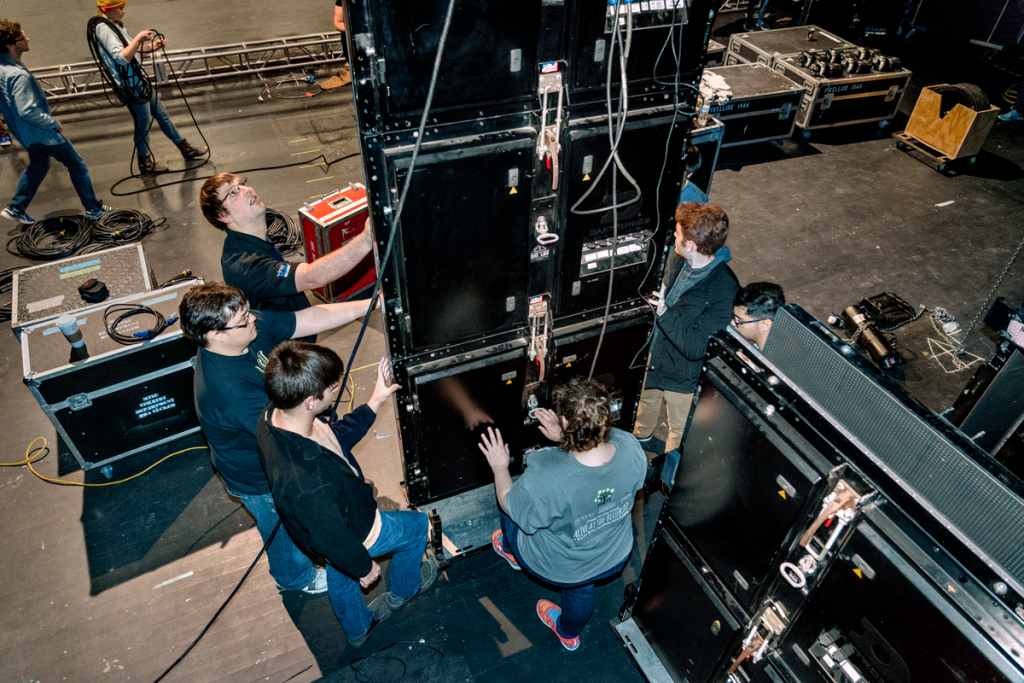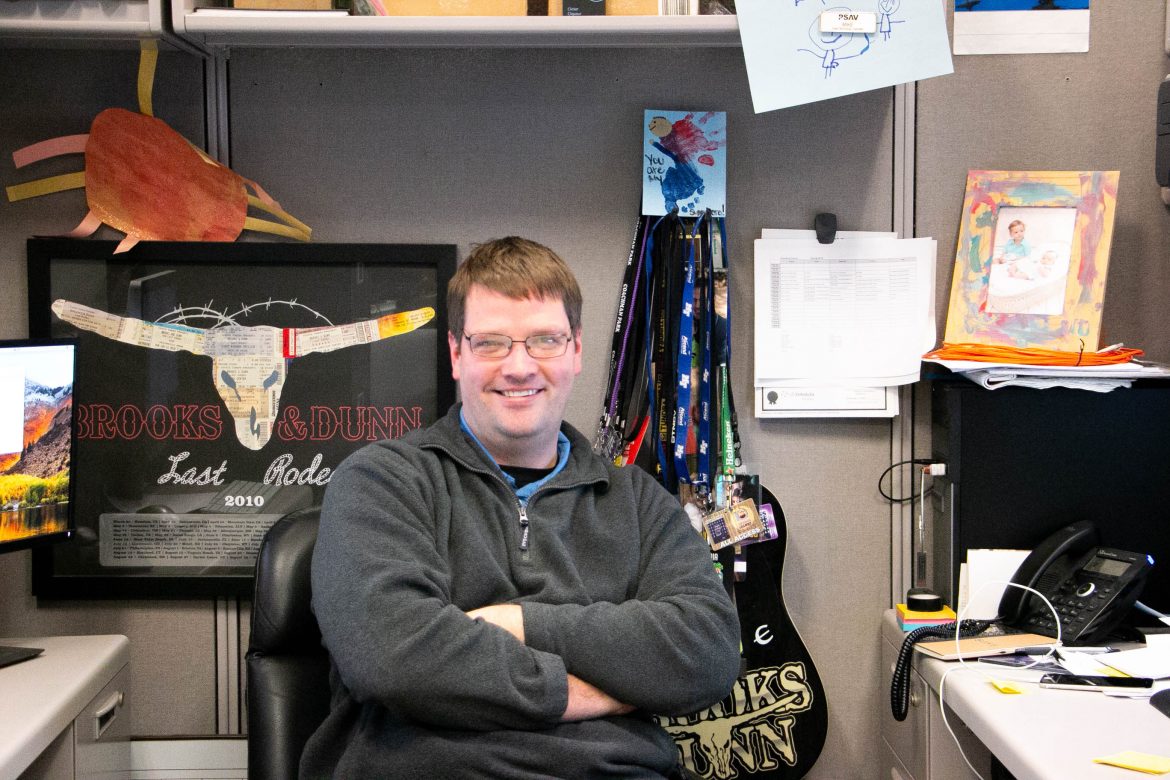If you’re like most curious students, you’ve probably looked up your professor before class has even started, hoping to get the scoop from fellow students on everything from attendance policies to whether or not they bring in snacks on test days.
While these are valid questions, if you decided to look up Michael Forbes, Assistant Director of Technical Systems for the Department of Media Arts and professor, you would have been left in the dark. Google reveals very little about this mysterious man, and to even find him on campus, one has to venture into the belly of the beast (read: Bragg’s long, endless, twisting hallways.)
Forbes says, however, he prefers it that way. A long time spent behind the technology has given him an appreciation for putting the student in the spotlight.
Based on student recommendations (and a glowing introduction by Marc Parrish, Director of Technical Systems, who loudly announced Forbes to me as “kind of a really big deal”), I sat down with Forbes and caught up with him on working at MTSU, life on the road, and tips for the media-savvy student.
1) Thank you for being willing to speak with me! So, for those of us students who don’t know you, explain what your position is at MTSU.

LED panel build and stage lighting for Joseph and the Technicolor Dreamcoat at Tucker Theater. Mike Forbes, Assistant Director of Technical Systems, Media Arts working with students to install LED panels. Photo by J. Intintoli.
“So I’m the Assistant Director of Technical systems for the Department of Media Arts. Basically, I’m a broadcast engineer. I’m more of a computer guy, (and) Mark Parrish is more of the broadcast side, but between the two of us, we keep up a lot of the School of Journalism stuff. The classrooms, the televisions inside the studios: we just make sure all of that is running for you guys and that everything looks good as far as what the students see… So we do a lot. We wear a lot of hats, but we also are kind of guiding students on how to use things. Like a student will come to me and say ‘I don’t know how to use this camera,’ we’ll sit down and I’ll show them the menus, why you do things the way you do, and stuff like that. I love it. I’ve been here seven and a half years…We get to do some great things with students.”
Forbes laughingly explained that this level of tech support has not always been the case.
“We had five cameras when I was a student. So, it was about a thousand students sharing 5 cameras. Now, if you go into the equipment checkout room, we have- last I counted- seventy cameras for the School of Journalism, twenty-five cameras for Video and Film Production, etc…and it’s because of the fact that we have completely turned our interests towards the students and what you guys are doing, and helping you and giving you the tools in order to be successful. Because ultimately our job is to be kind of behind the scenes and the ones that prop up the students for success.”
2) How did you get your position here at MTSU?
“I actually came here in 2004 as a student. I came from West Knoxville, with about 500 students in my graduating class. Out of 500, 10 of us came to MTSU. Everybody else went to UT. And I said to myself “I don’t want to be in high school all over again. I’m going to go outside of that and get out of my comfort zone.”…I came here, and I wasn’t really sure what I wanted to do- I knew I wanted to do film making, and I kind of found my niche for engineering. I graduated in 2008, (and) immediately hit the road. I started doing stuff with Brooks and Dunn, got incredible recommendations. So I got involved in that, and long story short…and I just kind of worked my way up. I learned new things, and I wasn’t afraid to stay extra, work hard, and learn the stuff that nobody else wanted to learn….When this job opened up, I got a call saying ‘Hey would you be interested in applying?’ So I did. I started working here in 2011, and I’ve learned a lot of stuff from a lot of people. It’s been a lot of fun. I love what I do, and the thing that I love most is never feeling like I am coming in to work. If you don’t love what you do, you need to find a new career field. I always feel like every day is different, every day presents its own unique challenges, and every day is just kind of a new adventure. “
3) Do you have a favorite memory from a class you taught?

Ludacris lit up Murphy Center with the help of Forbe’s tech class. (Photo courtesy of Tayhlor Stephenson / Sidelines)
“Oh yeah! So, Ludacris came to town, and we partnered with production services to provide the video content for that show… And the way it works is that you sit at a laptop and you can do all kinds of neat video effects and stuff like that that could just melt your brain. And I’ll never forget, I had this girl in my class and she was really shy. She raised her hand and quietly said ‘I would love to run the video wall,’ and I’m like ‘Okay, we’ll let you run it!’ So the show starts. And all of the sudden she just starts banging on the keys, and banging her head, and really into it, and I’m just sitting back there like ‘Who is this person?!’ And her boyfriend was right next to me and I said ‘Has she been practicing?’ and he goes ‘Uh huh!’ So, she literally brought down the house at Murphy Center.
I had this girl in my class and she was really shy. She raised her hand and quietly said ‘I would love to run the video wall,’ and I’m like ‘Okay, we’ll let you run it!’ …she literally brought down the house at Murphy Center.
Just absolutely blew the roof off of the place. She did a phenomenal job. As soon as we finished the show and the artist walked offstage, she looked up and she quietly goes ‘That was really fun.’ And then she went back to being shy. It was so funny to me because it was like there’s somebody who would have never in their life dreamed of doing that. And you have just planted that seed that says ‘you are capable of doing that.’ And if she had gone anywhere else in the United States to get an education, she would have missed out. But. She came here. We took her outside of her comfort zone. And we inspired her and now she likes to do that stuff and do it professionally. And she even tells me to this day that that was the most fun she’s had probably in her entire life. To me…that made it all worth it.”
If she had gone anywhere else in the United States to get an education, she would have missed out. But. She came here. We took her outside of her comfort zone. And we inspired her…
4) What one bit of advice would you give to students that you feel is most important?
“No question- get involved with the student organization in which you are interested in doing for a career. That is the most valuable thing that I did as a student. A lot of students come through and they take the classes, and they graduate and they have no extracurricular outside experience. And that’s a formula for disaster. So I tell students every single day to get involved with whatever student organization it is that they’re interested in. If you’re interested in video and film, get involved with film guild. If you’re interested in multi-cam stuff, get involved with MT10. If you’re interested in journalism, get involved with Sidelines. You know, whatever it is, don’t just come here and take the classes. Because I’ve seen it over and over again. The students that apply themselves and network, network, network, and go and do things outside of class, are generally successful. So that would be my biggest thing. Because everything else after that, like networking, and making connections, that all kind of falls in line after that.”
The opportunities given to students in the College of Media and Entertainment are particularly special, Forbes believes.
“That’s what I love about (this college). When everybody else is running away, we are running in. And we’re there to tell the story of what the event is, and tell it in a fair way. And I think we do a really good job of training you guys to do that. Because there’s a lot of schools out there that don’t give their students cameras, they don’t give their students any outlets, and we want you guys to be seen. That’s what I love.”
5) Now, the hard question: If you could have an album named after you, what would it be called, and what would the title track be?
“Oh that’s a good one. Hmm. I would say it would be jazz- not because I love jazz, but just because I like to go with the flow of things, and I feel like jazz is kind of like that. Because it doesn’t have a set rhythm, it doesn’t have a set melody. It’s like, whatever happens, happens. As far as an album title, I would say….I like to inspire students? So I would say something about inspiration. I’ve generally discovered that student may not know what they want to do, per say, but if you give them inspiration, or if you give them an idea or a goal, then that generally is kind of enough to kind of get them going. So I would kind of say ‘Inspire.’ And as far as a track, I would say….I know this sounds cheesy, but just ‘Push Your Boundaries.’ Get outside your comfort zone. Or, you know, go try new things.”


COMMENTS ARE OFF THIS POST